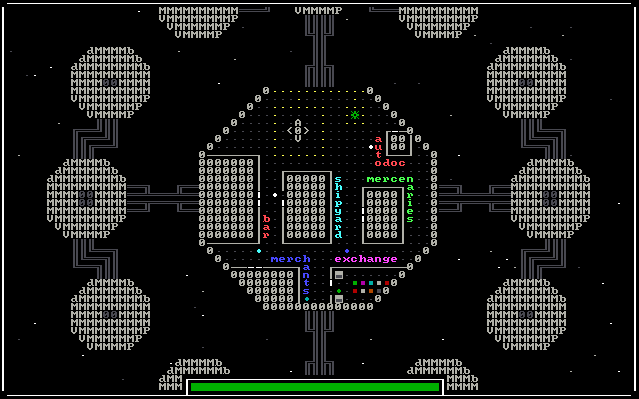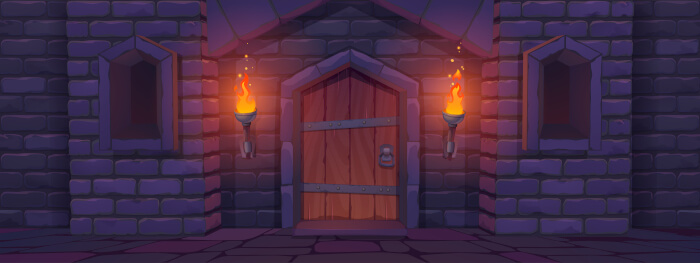Ascii Sector is a free space combat/exploration/trading game which is based on the classic computer game Wing Commander: Privateer released by Origin Systems in 1993.
In Ascii Sector, you start with a simple spaceship and can then accept missions or trade goods to earn enough money to upgrade your ship or buy a new one. You can engage in deadly fights both in space, on the ground and on board spaceships, and using the Ascii Sector scripting language, you can create your own quests for the game or have fun with other players’ quests.
Privateer: Ascii Sector allows you to freely roam the game universe, which currently consists of 32 systems and 45 bases and planets. (This number will increase in the next versions of the game. Visit www.asciisector.net for progress updates on the next version.)
As you travel in the game universe, you will be able to engage in dogfights with other spaceships and land on planets and bases. Here you can interact with the populace, upgrade and repair your ship – or buy a new ship – and get missions to complete in order to earn more money (called credits in the game).
There are three ways to get missions in the game: the Merchants’ Guild, the Mercenaries’ Guild, and fixers. Both the Merchants’ and Mercenaries’ Guild cost credits to join, but the fee is a small investment compared to the credits you’ll be able to earn by completing Guild missions. Most bases and planets have a Guild office with a mission terminal for you to use. When you log on to a mission terminal, the computer will connect to the Guild network and display the missions available to pilots of your rating. When you accept a mission, you’ll have a set time to do it within. The mission’s expiry date is the deadline. Completing missions will increase your rating and give you access to a greater amount and variety of missions, while failing to complete a mission, or not completing it before the deadline, will decrease your rating.
Fixers are people on bases and planets that have missions for you to do. They are usually found in bars, waiting for privateers to offer their services. Just like with Guild missions, you will have a set time frame within which to complete the mission. Successfully completing fixer missions will improve your reputation and more fixers will offer their missions to you, while failing missions will reduce your reputation.
You can always check your missions on your personal handheld computer (called a Quine) when on a base or planet, or in the nav computer when flying in space. Your Quine can store up to 15 missions at any time (not counting quest missions). When you have completed a mission, clear it from your Quine to free up space for new missions (if you have to return to your contact to collect your pay after completing a fixer mission, don’t clear it from your Quine until after you’ve been paid!).
The Quine is also where you save your game. Thus, you can only save your game while on a base or planet (but not while engaged in combat).
Taking on missions isn’t the only way to earn credits in the game. If your ship has a large enough cargo hold, you can earn a good deal of credits by buying commodities on one base or planet and selling them on another. This is done using the computer terminals in the Commodity Exchange.
To interact with your surroundings on a base, just walk into them (i.e. to talk to characters, use computer terminals, board your ship, or use a bed, just walk into it/them).
Features include:
- Uses the ANSI character set for the graphics.
- Real depth to the gameplay.
- Offers a wide variety of bases, missions, commodities and ships.
- Ships include: Broadsword, Centurion, Demon, Dralthi, Drayman, Galaxy, Gladius, Gothri, Kamekh, Nexus, Orion, Paradign, Stileto, Talon, Tarsus, and Ulysses.
- Four quadrants: Alizarin, Crimson, Mauve, and Viridian.
- Downloadable quests.
- Scripting of quests.
- Ascii Sector quest language, create your own stories in the Ascii Sector universe.
- NPCs on planets can be attacked and robbed.
- Persistent fleets that can move around, change control of systems, engage enemy fleets, head back for repairs and rebuilds.
- Ships whose systems have been disabled can be boarded.
- Download high quality music files.
Website: Website down
Support:
Developer: Christian Knudsen
License: Freeware

Return to Up-and-Coming Games | Return to ASCII Games | Return to Roguelike Games
| Popular series | |
|---|---|
| The largest compilation of the best free and open source software in the universe. Each article is supplied with a legendary ratings chart helping you to make informed decisions. | |
| Hundreds of in-depth reviews offering our unbiased and expert opinion on software. We offer helpful and impartial information. | |
| The Big List of Active Linux Distros is a large compilation of actively developed Linux distributions. | |
| Replace proprietary software with open source alternatives: Google, Microsoft, Apple, Adobe, IBM, Autodesk, Oracle, Atlassian, Corel, Cisco, Intuit, SAS, Progress, Salesforce, and Citrix | |
| Awesome Free Linux Games Tools showcases a series of tools that making gaming on Linux a more pleasurable experience. This is a new series. | |
| Machine Learning explores practical applications of machine learning and deep learning from a Linux perspective. We've written reviews of more than 40 self-hosted apps. All are free and open source. | |
| New to Linux? Read our Linux for Starters series. We start right at the basics and teach you everything you need to know to get started with Linux. | |
| Alternatives to popular CLI tools showcases essential tools that are modern replacements for core Linux utilities. | |
| Essential Linux system tools focuses on small, indispensable utilities, useful for system administrators as well as regular users. | |
| Linux utilities to maximise your productivity. Small, indispensable tools, useful for anyone running a Linux machine. | |
| Surveys popular streaming services from a Linux perspective: Amazon Music Unlimited, Myuzi, Spotify, Deezer, Tidal. | |
| Saving Money with Linux looks at how you can reduce your energy bills running Linux. | |
| Home computers became commonplace in the 1980s. Emulate home computers including the Commodore 64, Amiga, Atari ST, ZX81, Amstrad CPC, and ZX Spectrum. | |
| Now and Then examines how promising open source software fared over the years. It can be a bumpy ride. | |
| Linux at Home looks at a range of home activities where Linux can play its part, making the most of our time at home, keeping active and engaged. | |
| Linux Candy reveals the lighter side of Linux. Have some fun and escape from the daily drudgery. | |
| Getting Started with Docker helps you master Docker, a set of platform as a service products that delivers software in packages called containers. | |
| Best Free Android Apps. We showcase free Android apps that are definitely worth downloading. There's a strict eligibility criteria for inclusion in this series. | |
| These best free books accelerate your learning of every programming language. Learn a new language today! | |
| These free tutorials offer the perfect tonic to our free programming books series. | |
| Linux Around The World showcases usergroups that are relevant to Linux enthusiasts. Great ways to meet up with fellow enthusiasts. | |
| Stars and Stripes is an occasional series looking at the impact of Linux in the USA. | |
